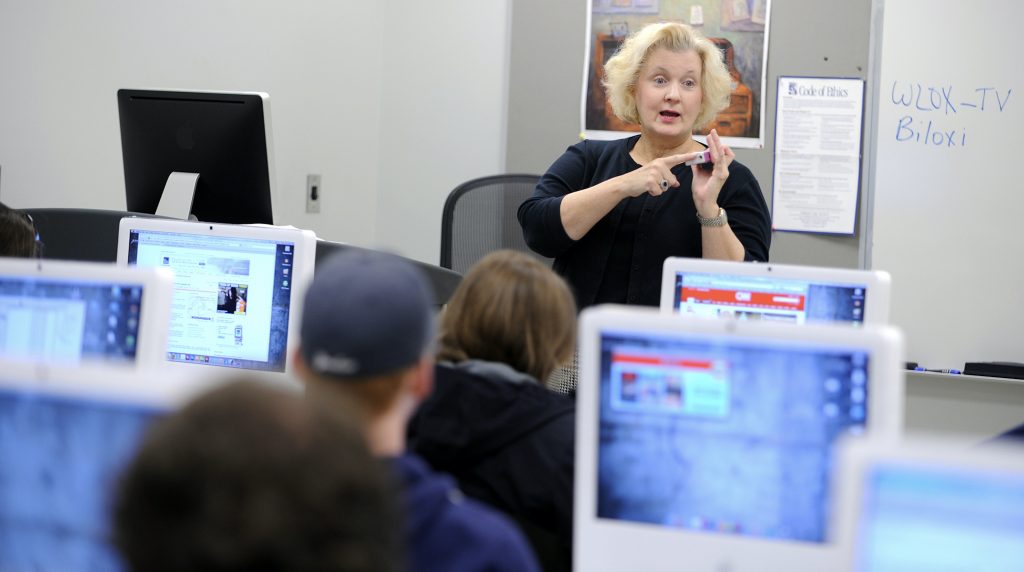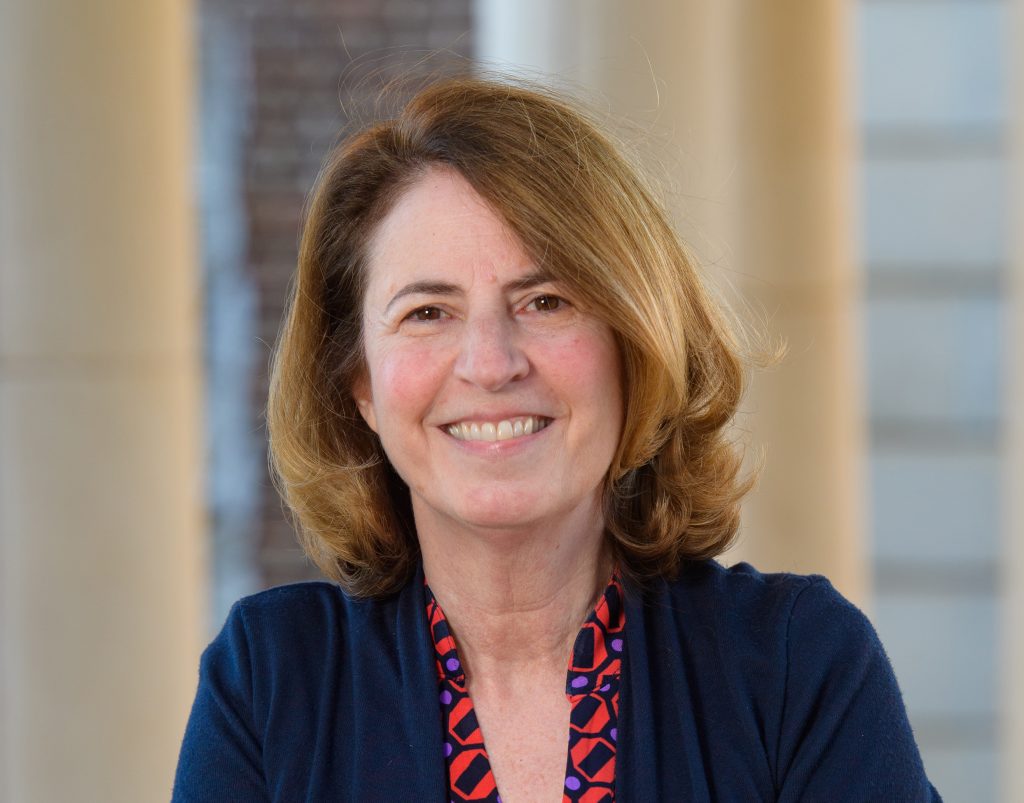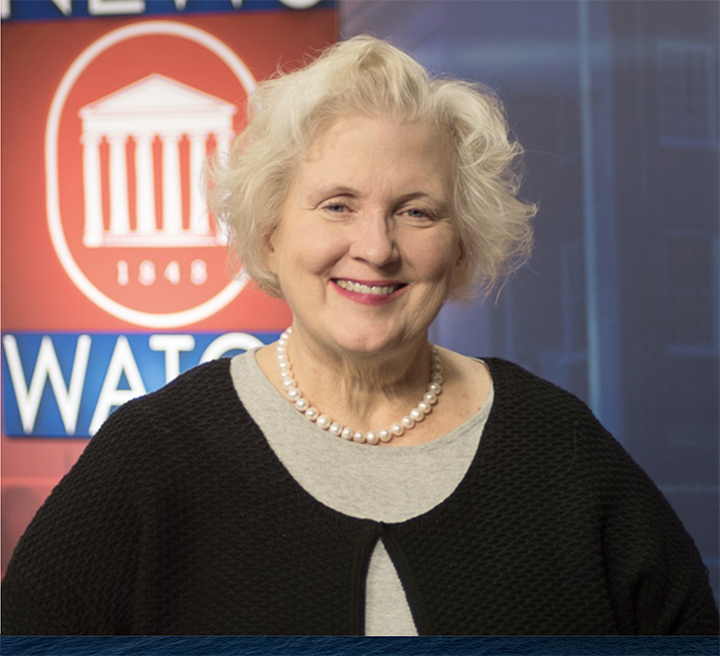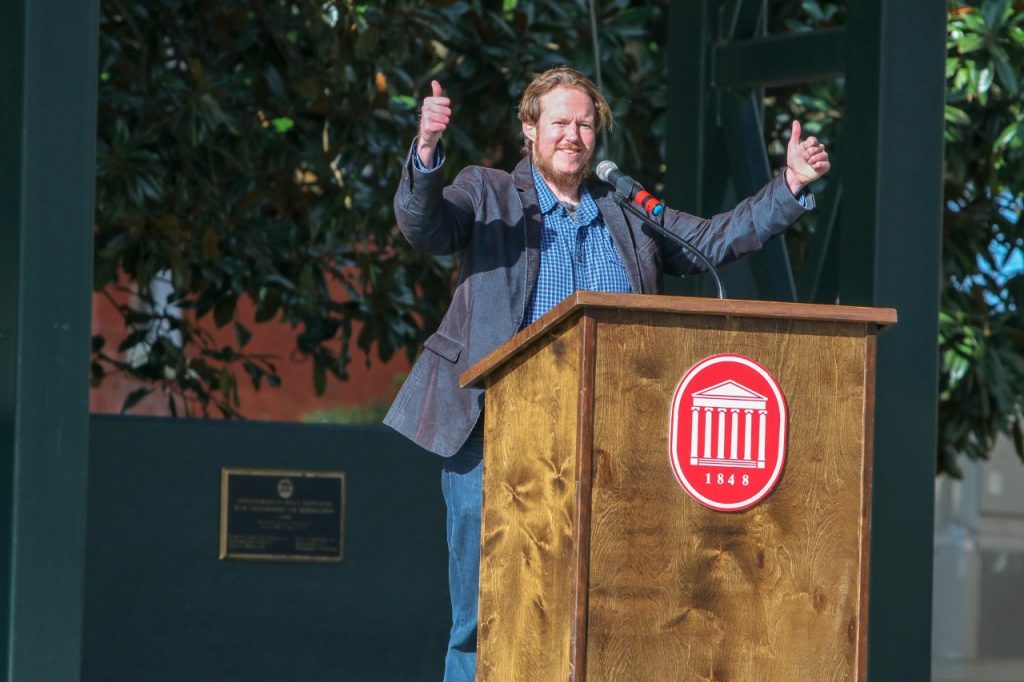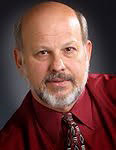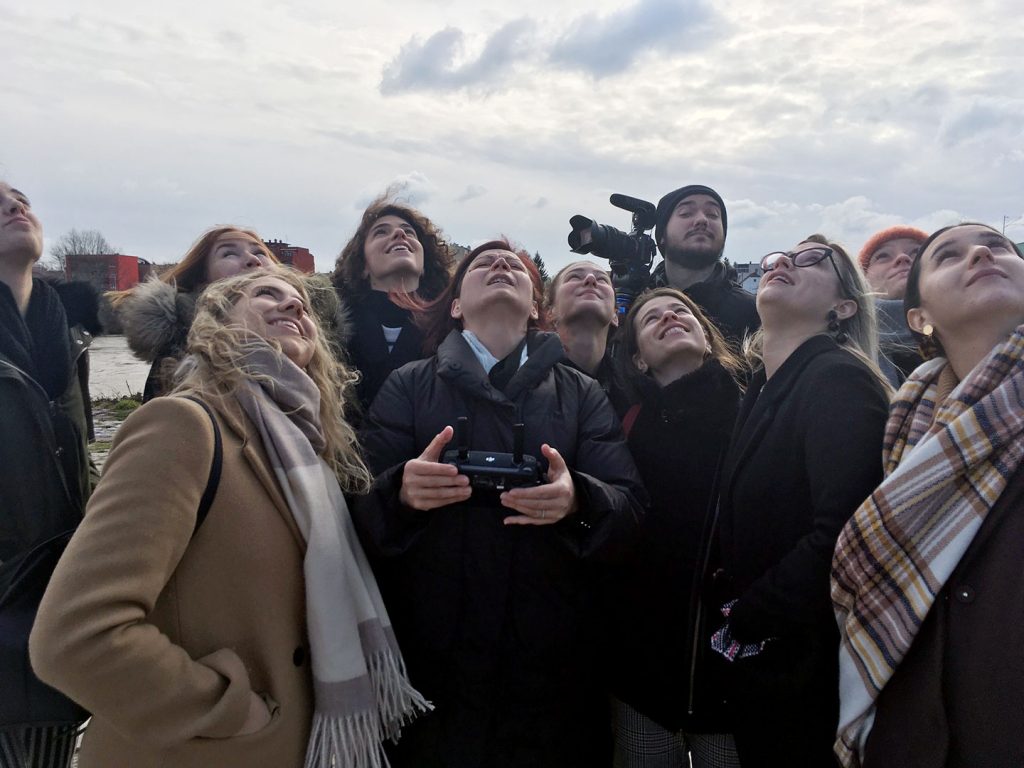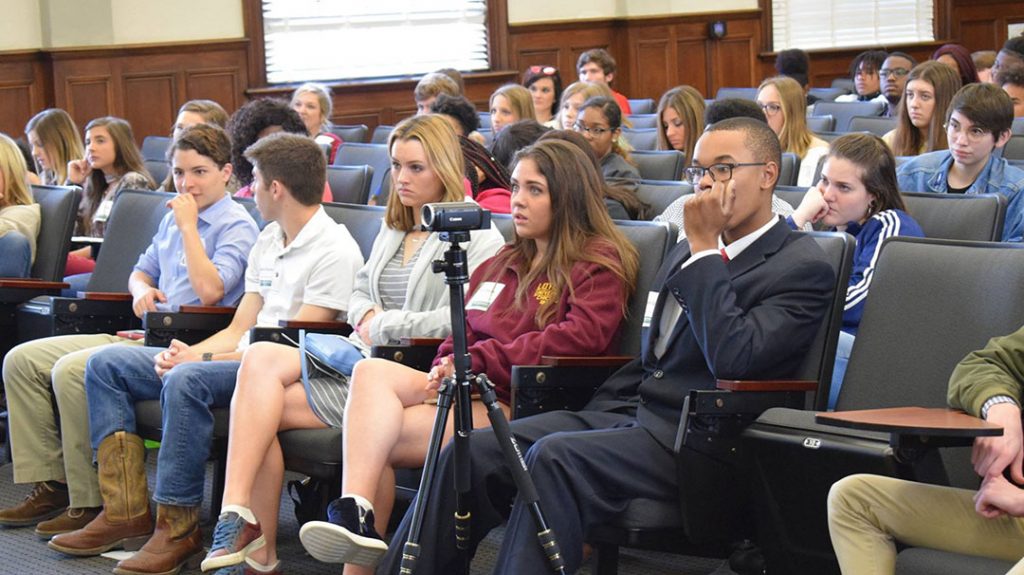
High school journalism students are among the smartest students in their schools. They are the creatives, intellectuals and critical thinkers. They question everything around them, and high school journalism teaches them life skills that are transferrable to any other career.

R.J. Morgan, left.
That’s why R.J. Morgan, Mississippi Scholastic Press Association director, is passionate about his job and the MSPA State Convention set for Friday, March 31, on the University of Mississippi campus.
UM will soon welcome 500-600 high school students. The convention will be held in Farley Hall with breakout sessions in Lamar, Yerby and Brevard Halls. The event will begin with breakfast and registration in the Grove from 8 a.m. to 9 a.m. and an opening welcome. Students will attend three breakout sessions at 9:30 a.m., 10:30 a.m. and 11:30 a.m. They will break for lunch in the Grove at 12:15 p.m., and the afternoon events will begin at 1 p.m. in the Ford Center with the keynote speaker and awards program. The deadline to register is March 20.
The keynote speaker is essayist and Jackson native Kiese Laymon, who attended Millsaps College and Jackson State University before graduating from Oberlin College, a private liberal arts college in Oberlin, Ohio. He earned a master’s degree in fine arts in fiction from Indiana University and is now a professor of English and African American studies at the University of Mississippi.
 Laymon is author of the novel Long Division and a collection of essays called How to Slowly Kill Yourself and Others in America, the UK edition released in 2016. He has written essays, stories and reviews for numerous publications including Esquire, ESPN the Magazine, Colorlines, NPR, LitHub, The Los Angeles Times, The Guardian, PEN Journal, Oxford American, The Best American Series, Ebony and Guernica, according to his bio at kieselaymon.com. He has two books in the works, including a memoir called Heavy and a novel called And So On, expected in 2017 from Scribner.
Laymon is author of the novel Long Division and a collection of essays called How to Slowly Kill Yourself and Others in America, the UK edition released in 2016. He has written essays, stories and reviews for numerous publications including Esquire, ESPN the Magazine, Colorlines, NPR, LitHub, The Los Angeles Times, The Guardian, PEN Journal, Oxford American, The Best American Series, Ebony and Guernica, according to his bio at kieselaymon.com. He has two books in the works, including a memoir called Heavy and a novel called And So On, expected in 2017 from Scribner.
“He’s a native Mississippian, who has gone on to be a highly respected and published voice,” Morgan said. “He’s so nuanced and really does a good job of articulating a point of view. That’s what I think he’s going to talk about. He was a high school journalist. When we can, we like to find people who were high school journalists.”
Morgan said the MSPA includes about 80 high school member publications. Web only is a small part. Most are newspapers, yearbooks or broadcasts. He said high school journalism teaches students how to organize their thoughts and express them clearly and concisely. It teaches them how to communicate, talk to their peers and strangers, and interview someone.
“It teaches them the importance of deadlines, the importance of design, and the way you structure things for maximum utility,” Morgan said. “High school journalism teaches them to question society, to look at things around them, and to look at what is being presented to them on the surface and critique it, whether that is their school policy on dress code or whether that is a bigger community issue.”
Oxford High School recently published a story about homelessness in Oxford. The student journalists identified and interviewed 93 members of their school district who are homeless in Oxford, Morgan said.
“Now there are groups and community organizations that are donating and trying to help those people,” he said, “and so it’s an extremely valuable learning experience that those kids take with them.
“To use education terminology, high school journalism is a really good exercise in the project-based learning theory. You give students an outlet, whether that is tomorrow’s broadcast or next week’s newspaper. You teach them the base skills that are required of that, and then you let them innovate, develop and create their own process to get from point A to point B, and that type of learning is really advanced and really challenges them as individuals.”
MSPA is the high school journalism organization in Mississippi. The association works with high school staffs all across the state in four areas – school newspapers, including online-only publications, print publications and news magazines; yearbooks, which almost every school has; broadcasts, which have doubled in the last two years; and awards and sessions for literary magazines for creative writing students.
“Our state convention offers skills workshops and education to help students better serve the communities in which they live and work,” Morgan said. “We also run a number of contests to honor and validate people in those four areas.”
The convention always offers basic interviewing, newswriting skills and yearbook design sessions. This year, they’ll also hold sessions on press rights and censorship in schools.
“We’re going to do a session on the current climate around media in our country, and the way we’ve been labeled, and how students can go about dealing with that,” Morgan said. “We have several different specialty sessions I’m excited about.”
Robby Donoho, a sports anchor from WCBI in Columbus, will lead several sessions.
“We really try to gather speakers in the industry and those who are teachers of journalism from across the state and beyond,” Morgan said. “I have a photographer coming from Forsyth County News in Atlanta. He is a photographer and also a content director for the non-daily newspaper, and student publications are essentially non-dailies. They might publish once a month if they are lucky. Usually, it’s more like twice or three times a semester, and so I think having the ability to hear some professional non-daily workflow information will be really neat.”
Morgan said they also try to bring in marketing speakers because the University of Mississippi has an integrated marketing communications program. They try to teach students how to market their publications and better develop their brand identity.
When MSPA started in 1947, Morgan said the convention was similar to a camp. The role of school publications has changed a lot in the past 70 years, and the convention has been a one-day event since the 1970s.
“We are one of the older scholastic press associations and one of the best attended scholastic press associations in the country,” said Morgan. This is his fourth year to direct the convention, and he said students teach him more than he teaches them regarding language evolution and technology.
“This generation – they are really innovative storytellers,” he said. “I don’t think they necessarily see themselves that way, but the way they communicate with themselves and their peers through social media and print – through broadcast, shorthand, longform – there are so many different ways they can communicate and get information to their audience. They really just amaze me.”
Morgan’s goal for every conference is to give students seeds of knowledge in new areas.
“When they get back to their schools,” he said, “it is then up to them, their communities and their teachers to foster the growth of those seeds, to the extent that we, in five and six hours, can open their mind to a new way of doing things, a better or more professional way of handling themselves, covering an event or telling a story.”
Morgan said he hopes the MPSA is a factor in the Meek School of Journalism and New Media’s growing enrollment. It is one of the fastest growing programs at UM.
“Anytime you can get 500 of the best and brightest high school students from the state on your campus, and on a campus as beautiful as this, they can’t help but take something away from it,” Morgan said. “Anytime you can get them in a facility interacting with professors that are as engaging and as interactive as ours, I don’t see how that doesn’t spark their attention.”
Morgan said the MSPA is not a recruiting arm, and they do not try to indoctrinate students about UM. They are a statewide organization focused on developing high school journalists.
“But a rising tide lifts all boats, and you can see the quality of students coming to Ole Miss begin to rise,” said Morgan who believes high school journalism is an important part of education in a media-saturated world.
“I talk to high school administrators all the time who have cut the school newspaper, or who have cut the journalism program from the school because there’s so much pressure at that level for state testing and core curriculum, etc.,” he said. “I had a school administrator tell me one time, ‘Yeah. We don’t do a school newspaper anymore because nobody reads those. Newspapers are kind of a dying thing.’
“And after I calmed down, I challenged his point of view, and I said, “So your position is that a student living in 2017 needs to know less about how media works and media literacy than they did in 1985? We are such a media society now. We are over-saturated with media, stimuli everywhere you look – on our phones, on our television screens, 24 hour news, Twitter, the barrage of bits of information that are coming to us all the time. So by teaching students journalism skills, by teaching them to be better thinkers, it also teaches them to be media consumers.”
If you plan on attending the convention or following it, the event hashtag is #MSPA17.
Contact R. J. Morgan for more information at morgan@olemiss.edu or 662-915-7146.
- Story by LaReeca Rucker, adjunct journalism instructor

